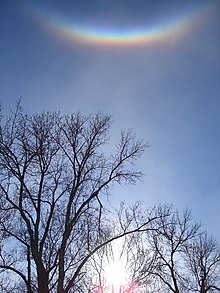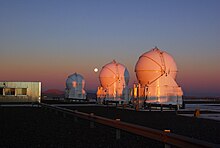|
Optical phenomenon Optical phenomena are any observable events that result from the interaction of light and matter. All optical phenomena coincide with quantum phenomena.[1] Common optical phenomena are often due to the interaction of light from the Sun or Moon with the atmosphere, clouds, water, dust, and other particulates. One common example is the rainbow, when light from the Sun is reflected and refracted by water droplets. Some phenomena, such as the green ray, are so rare they are sometimes thought to be mythical.[2] Others, such as Fata Morganas, are commonplace in favored locations. Other phenomena are simply interesting aspects of optics, or optical effects. For instance, the colors generated by a prism are often shown in classrooms.  ScopeOptical phenomena encompass a broad range of events, including those caused by atmospheric optical properties, other natural occurrences, man-made effects, and interactions involving human vision (entoptic phenomena). Also listed here are unexplained phenomena that could have an optical explanation and "optical illusions" for which optical explanations have been excluded. There are many phenomena that result from either the particle or the wave nature of light. Some are quite subtle and observable only by precise measurement using scientific instruments. A famous example is the bending of starlight by the Sun during a solar eclipse, a phenomenon that serves as evidence for the curvature of space as predicted by the theory of relativity. Atmospheric optics   Atmospheric optical phenomena include:
Atmospheric optical phenomenon Non-atmospheric optical phenomena Other optical effects
Entoptic phenomena
Optical illusions
Unexplained phenomenaSome phenomena are yet to be conclusively explained and may possibly be some form of optical phenomena. Some[weasel words] consider many of these "mysteries" to simply be local tourist attractions that are not worthy of thorough investigation.[4] See alsoReferences
SourceOzerov, Ruslan P.; Vorobyev, Anatoli A. (2007). "Wave Optics and Quantum–Optical Phenomena". Physics for Chemists. pp. 361–422. doi:10.1016/B978-044452830-8/50008-8. ISBN 978-0-444-52830-8. Further reading
External linksWikimedia Commons has media related to Optical phenomena.
|

